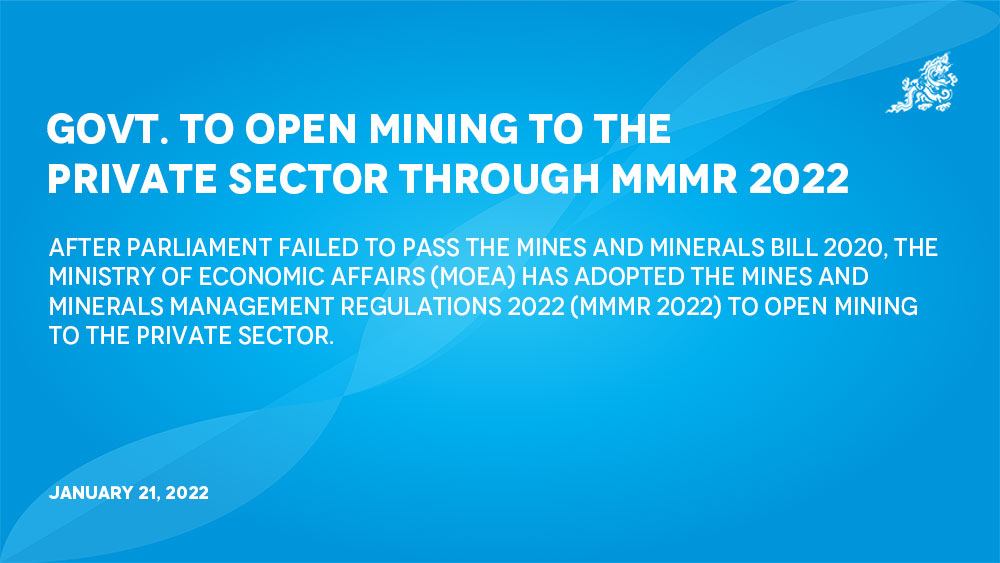Mining and quarrying activities dropped by -81.84 percent in 2020
Thukten Zangpo
After Parliament failed to pass the Mines and Minerals Bill 2020, the Ministry of Economic Affairs (MoEA) has adopted the Mines and Minerals Management Regulations 2022 (MMMR 2022) to open mining to the private sector.
According to the regulations, a Bhutanese citizen as an individual or a proprietor of a licensed firm, a household, a company, and a state-owned agency can lease mineral deposits and quarries from January 14 this year.
The Mines and Minerals Management Act 1995, in its Section 21, empowers the MoEA to lease mineral deposits to both private individuals and state-owned corporations.
Private participation in the operation of mines was suspended in June 2020, following which the State Mining Corporation Limited took over all gypsum, dolomite, and coal mines operated by private companies.
The mining and quarrying sector growth saw a contraction by negative 81.84 percent in 2020. Its share declined from 4.80 percent in 2019 to 1.20 percent of GDP in 2020, a drop by 3.61 percentage points.
The new regulations are expected to revive the economic growth that slumped to a negative 10.08 percent in 2020.
In an earlier interview, Minister of Economic Affairs, Loknath Sharma, said that the mines and minerals sector, which has been identified as one of the five jewels of the economy, will play an important role in the recovery of the economy.
He added that activities contributing value addition will be given preference.
According to the new regulations, the ministry shall directly allocate proven mineral reserves to state-owned mining agencies based on their wider economic benefits, high potential for export in primary form, the potential for generating substantial revenue, reliable and affordable supply of minerals and mineral products in the country, or sustainable development of mineral resources.
However, the direct allocation of the proven mineral reserve or leasing of mines to private individuals or companies shall be based on the supply of raw materials for the establishment of a domestic processing industry or supply of critical additives to domestic industries.
Moreover, private individuals or companies are not eligible to obtain mining leases where they are already leased to state-owned mining agencies.
The regulations also state that the term of initial lease or renewal shall not exceed the expected economic life of a mine or a maximum period of 15 years, whichever is less.
It also stated that private companies are eligible to obtain or operate not more than two mining or quarrying leases at any point in time. However, the limitation of two mining or quarrying leases does not apply to state-owned mining agencies.
It also stated that if the lessee has not commenced mining operations within a period of two years from the date of grant of the lease or discontinues mining operation for a period exceeding two years, the lease lapses. “However, the ministry can revive and modify the lease if the lessee has written an application that the discontinuance was due to reasons beyond the control of the lessee.”
MMMR 2022 also stated that the lessee has to pay royalties and mineral rent to the government at the rates prescribed by the government. “Also, the lessee has to deposit an environmental restoration bond to the government as security for mine reclamation and environmental restoration in the mine, to ensure the threat of the negative impacts on the surrounding environment are minimised.”
Meanwhile, the Department of Geology of Mines plans to establish a national mineral resources database.


